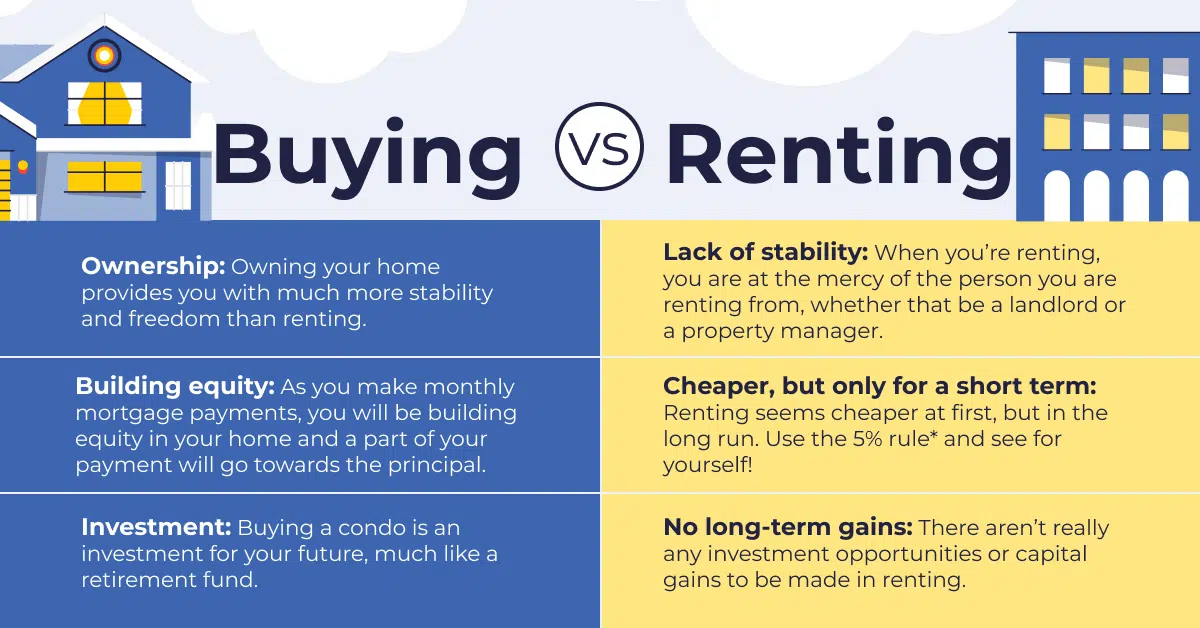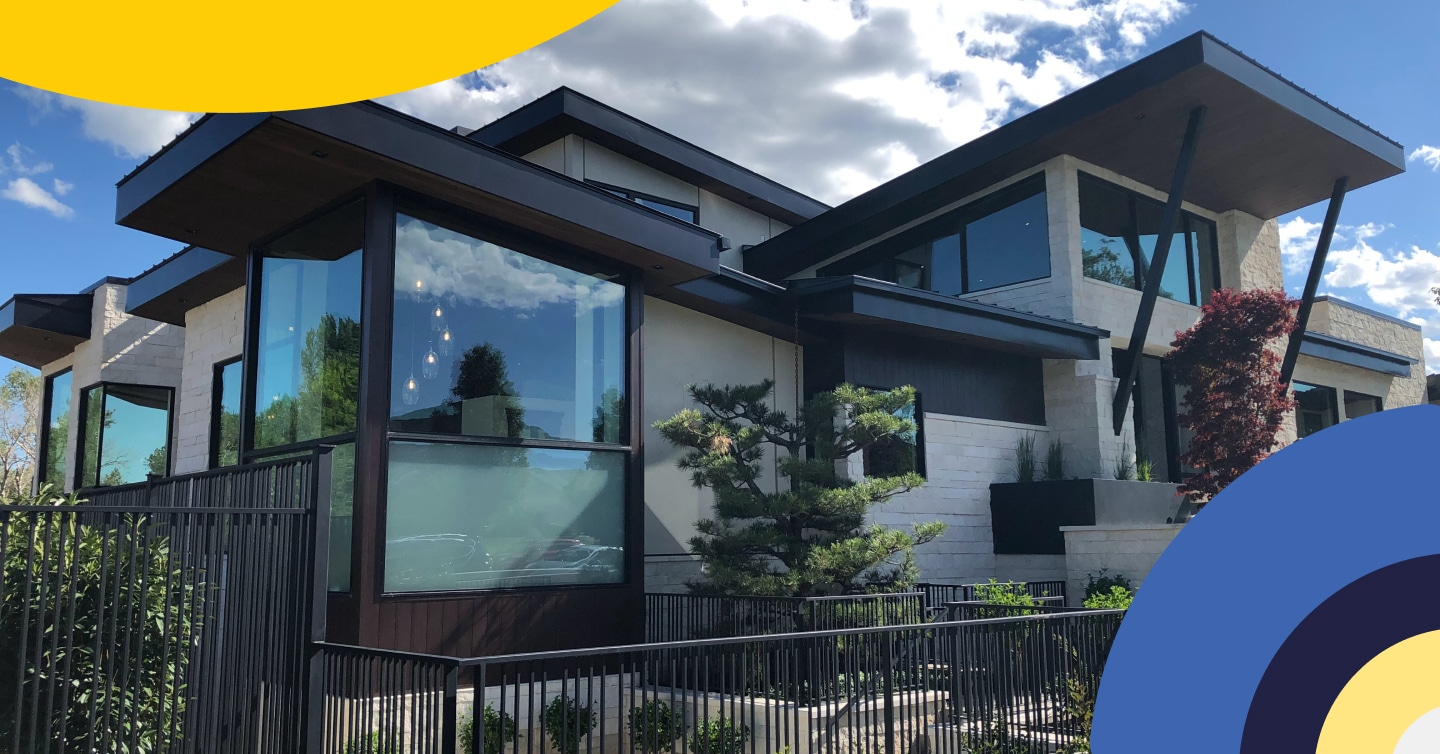Real Estate #Featured articles
Real Estate #Featured articles
What’s the Difference Between an Apartment and a Condo?

Table of contents
Are you a first-time home buyer in Canada trying to make sense of the property market? You’ve probably come across the terms “condo” vs “apartment,” but maybe not quite sure what distinguishes one from the other. Well, lucky for you, we’re here to provide some insight into this confusing matter so your property search can be smoother sailing! In this blog post, we’ll discuss the key differences between condos vs apartments in Canada so that you can better understand which option is right for you.
Key Highlights
- An apartment usually refers to a unit rented by its occupants, while a condo is typically owned by its occupants.
- Apartments are a great rental solution if you want flexibility and a short-term living situation.
- Buying a condo is a better investment and is the more cost-effective option when looking at the long-term picture.
What is an Apartment?
An apartment is a private dwelling unit in a larger residential building or apartment complex. An apartment can range in size from a studio apartment, which typically features one room with a separate kitchen and bathroom, to larger units with multiple bedrooms and restrooms. Apartment units are usually owned by the apartment complex owner, while renters pay fees and rent payments on their apartment units. Apartments may come furnished or unfurnished, and many offer pools, laundry facilities, fitness centers, and playgrounds. Apartment living can provide an economical alternative for those interested in city living but wanting to minimize expenses associated with buying or renting dedicated homes or condos.
What is a Condo?
A condo, or condominium, is an apartment owned by an individual instead of the apartment building’s landlord. Condos come with additional benefits and responsibilities that one wouldn’t find in a traditional apartment, including ownership over certain portions of the building and a basic agreement with other condo owners to uphold upkeep standards. This could mean sharing repairs, respecting noise levels, and paying homeowner dues for shared amenities like lawn maintenance. Owning a condo can be a great way for those looking for apartment living but also wanting access to more responsibilities and ownership associated with owning property.
What’s the Difference Between an Apartment and a Condo?
While the terms are often used interchangeably, some fundamental differences exist between apartments and condos, notably how they are acquired and maintained.
Renting vs. Owning
The biggest difference between an apartment and a condo is that an apartment is rented while a condo is owned. This means that with an apartment, you are essentially paying someone else to live in their property. With a condo, you are the property owner and can do with it as you please (within the rules and regulations set forth by the condo association).

Maintenance and Upkeep
Another big difference between an apartment and a condo is who is responsible for the maintenance and upkeep of the property. The landlord is typically responsible for any maintenance or repair issues with an apartment. With a condo, the unit owners are typically responsible for taking care of their unit, but the condo association typically maintains the common areas (e.g., hallways, lobby, etc.).
Rules and Regulations
Finally, another key difference between an apartment and a condo is the rules and regulations that each type of living arrangement has. Apartments typically have more rules and regulations than condos because they are rented properties. For example, apartments typically have strict noise ordinances that must be followed to maintain peace for all of the tenants. On the other hand, Condos typically have fewer rules and regulations because they are owned properties.
Pros & Cons of a Condo
| Pros | Cons |
|---|---|
| Ownership: This one might seem obvious, but the fact that you own your condo will provide you with much more stability and freedom than renting. Moreover, mortgage payments are a predictable monthly expense even during inflation, which is not guaranteed with renting, where rent prices change yearly or between tenants. | Less flexibility: If you are not ready to settle down, buying a condo might not be your ideal investment. Buying a condo is a commitment, and backing out of a mortgage or putting a home back on the market is not as easy as getting out of a lease agreement. |
| Building equity: As you make monthly mortgage payments, you will be building equity in your home, and a part of your payment will go toward the principal. At first, it might be discouraging to see your payments mostly go towards the interest on your loan, but that will decrease over time. | Maintenance costs: Buying a home is always a smart investment, but it is one you have to dedicate a lot of time and money to after your purchase. Home maintenance ranges from small, daily tasks to yearly repairs and upkeep, many of which come with a hefty price tag. |
| Investment: Buying a condo is an investment for your future, much like a retirement fund. Once you pay it off, your home becomes an asset. Think of it as a long-term investment that you get to live in! | Mortgage payments: In line with the previous con, buying a condo will make a dent in your wallet for years to come. Between maintenance costs and monthly mortgage payments, your home might be your primary investment for a while. |
| Long-term gains: If you’re home increases in value, you can see some capital gains by selling it for a higher price than you bought it for. Historically, the Canadian market has allowed this to happen often. |
Pros & Cons of an Apartment
| Pros | Cons |
|---|---|
| Flexibility: If you don’t plan on staying in the same place for very long, renting an apartment gives you way more flexibility to move whenever you want since lease contracts are short-term commitments, usually no more than a year. | Lack of stability: When you’re renting you are at the mercy of the person you are renting from, whether that be a landlord or a property manager. Besides needing permission to alter your space, you have much less control. |
| Maintenance: When renting an apartment, your landlord or property manager is responsible for the maintenance of the home. Not only will this save you time and money if the home suffers significant damage, but you also are not at any kind of loss or financial risk. | Cheaper (short term): Renting seems cheaper at first, but it is no secret that renting brings you 0 returns in the long run. Long-term renting is not the cheapest option if you consider the investment opportunity and capital gains associated with buying a home. |
| Saving money: There’s a reason renting is the more affordable option for low-income households. In the short term, renting an apartment is cheaper than owning a home and making mortgage payments. Even if you can afford to buy, a condo is not an investment everybody wants to make, and renting can allow you to invest more of your money differently. | No long-term gains: Unless your rent is exceptionally cheap compared to getting a mortgage, there aren’t any investment opportunities or capital gains to be made in renting. |
Find a better rate, and we’ll match it, beat it, or give you $500*.
*Conditions Apply
With nesto, it’s stress-free
Affordability Between a Condo vs. an Apartment in Canada
At first glance, renting an apartment may seem more affordable than buying a condo, but that’s not usually the case, especially if you are looking for a long-term living situation. When comparing these two options, you might be prompted to compare monthly rent to mortgage payments. However, this is not an accurate financial representation.
For this comparison to make sense, include unrecoverable costs in your calculation using the 5% rule and factoring in home equity. In doing so, you might notice that, in the long term, owning a condo is significantly more cost-effective than renting an apartment.
Condo vs Apartment: Which is Best for You?
When deciding between an apartment vs a condo, it all boils down to whether you want to own or rent your home. There are benefits to both options, depending on your circumstances. Renting an apartment is better if you need a flexible housing solution for short-term living situations. On the other hand, buying a condo is the superior long-term investment if you plan to live in your home for more than 5 years.
FAQ
Is a condo better than an apartment?
A condo is considered better than an apartment because you own a condo, while apartments are usually rented by their occupants. In the long term, buying a house is the more financially sound option and a significantly better investment.
What is causing the housing crisis in Toronto?
At first glance, renting an apartment may seem more affordable than buying a condo, but that’s not usually the case, especially if you are looking for a long-term living situation. When comparing these options, ensure you incorporate unrecoverable costs using the 5% rule into your calculations and factoring in home equity. With this more accurate assessment, you’ll find that, in most cases, buying a condo is the more cost-effective option in the long run.
Is it worth it to invest in a condo?
Yes, it is worth investing in a condo, especially if you are a first-time home buyer. Condos are a great entry point into real estate, as they give home buyers a taste of ownership without the mountain of responsibilities that come with a detached home.
Final Thoughts
All in all, it depends on what you are looking for as to whether an apartment or condo is the better option. If you need flexibility and intend on only living somewhere for a short period, then an apartment might be right for you. However, buying a condo is probably your best bet if you are looking for something more permanent and cost-effective in the long run. Regardless of which route you choose, shop around for the best mortgage rates before making any decisions.
Ready to get started?
In just a few clicks, you can see our current rates. Then apply for your mortgage online in minutes!















